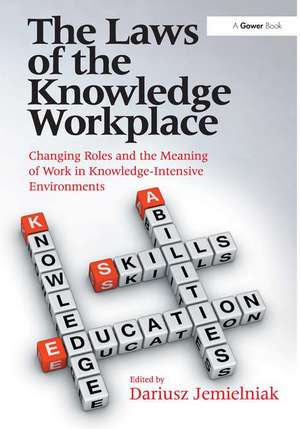The Laws of the Knowledge Workplace: Changing Roles and the Meaning of Work in Knowledge-Intensive Environments
Autor Dariusz Jemielniaken Limba Engleză Hardback – 10 sep 2014
Preț: 820.56 lei
Preț vechi: 1103.16 lei
-26% Nou
Puncte Express: 1231
Preț estimativ în valută:
157.02€ • 162.88$ • 130.93£
157.02€ • 162.88$ • 130.93£
Carte tipărită la comandă
Livrare economică 27 martie-10 aprilie
Preluare comenzi: 021 569.72.76
Specificații
ISBN-13: 9781472423887
ISBN-10: 1472423887
Pagini: 178
Dimensiuni: 174 x 246 x 17 mm
Greutate: 0.49 kg
Ediția:1
Editura: Taylor & Francis
Colecția Routledge
Locul publicării:Oxford, United Kingdom
ISBN-10: 1472423887
Pagini: 178
Dimensiuni: 174 x 246 x 17 mm
Greutate: 0.49 kg
Ediția:1
Editura: Taylor & Francis
Colecția Routledge
Locul publicării:Oxford, United Kingdom
Public țintă
Professional Practice & DevelopmentRecenzii
’The Laws of the Knowledge Workplace is not just another publication on a fashionable topic. It goes beyond the easy introduction of the knowledge work and knowledge workers concepts. The authors dig deeper, and in research-based chapters introduce work as perceived by the knowledge workers themselves. It focuses on the ways knowledge workers define, organize and make sense of their workplace. Moreover, it presents studies from different cultural contexts, and this international perspective is still insufficiently researched and described. In my opinion this book is critical reading for anyone who wants to understand the nature, and multidimensional character of knowledge work.’ Beata Glinka, The University of Warsaw, Poland ’Knowledge workers are praised as the most value-adding group of employees, and analyzed as gurus, hired guns or warm bodies. Their diploma-wielding and cappuccino-sipping clusters advance business companies to the ranks of knowledge-intensive organizations. But do we really know what knowledge workers do when they work? Jemielniak and his authors decided to listen to their stories. Do they enjoy a chance to be creative or deplore a collapse of a distinction between work and household time? What are the managerial lingos and employee power games between clouded onliners, the wizards of the world wide web, who trust but check? Virtual teams and virtual organizing are studied along with nepotism and networking, trust and professional identities, power and roles. Speaking of the laws of knowledge work betrays ambition to go beyond the functional, neopositivist paradigm of quantitatively biased mainstream research projects. Harvard’s labor and worklife program and Kozminski’s university sabbatical are among the establishment sponsors of this mildly subversive but strongly recommended collection of studies. All of them confirm that innovation becomes increasingly a collective game and that network leadership is one
Notă biografică
Dariusz Jemielniak is an associate professor at Kozminski University. He heads up the Center for Research on Organizations and Workplaces (CROW). He was a visiting scholar at Cornell University (2004-2005), Harvard University (2007, 2011-2012), and University of California, Berkeley (2008). He is an elected member of the Young Scholar's Academy of the Polish Academy of Sciences. His research interests include knowledge work, open collaboration projects, and higher education critical management studies. His recent publications include an ethnographic analysis of the Wikipedia community (Common Knowledge?, 2014 Stanford University Press) and an ethnographic study of software engineers (The New Knowledge Workers, 2012 Edward Elgar Publishing).
Cuprins
Chapter 1 Introductionducing the Laws of the Knowledge Workplace, DariuszJemielniak; Chapter 2 Accretion, Angst and Antidote: The Transition from Knowledge Worker to Manager in the UK Heritage Sector in an Era of Austerity, AlistairBowden, MalgorzataCiesielska; Chapter 3 Nepotism and Turnover Intentions amongst Knowledge Workers in Saudi Arabia, Maryam AlhamadiAldossari, Dorota JoannaBourne; Chapter 4 Knowledge Work and the Problem of Implementation: The Case of Engineering, Lars BoHenriksen; Chapter 5 Coordinating the Repair and Modification of Offshore Production Systems: The Role of the Project Manager, VidarHepsØ; Chapter 6 Role of the Virtual Team Leader: Managing Changing Membership in a Team, KajaPrystupa-Rz?Dca, DominikaLatusek-Jurczak; Chapter 7 Decision Support Systems as Knowledge Workers, AleksandraPrzegalinska; Chapter 8 Qualitative Research on the Organization of Work in Internet Prosumer Projects, SebastianSkolik; Chapter 9 Innovative Networks in Knowledge-Intensive Industries: How to Make Them Work? An Empirical Investigation into the Polish Aviation Valley, WojciechCzakon, PatrycjaKlimas;
Descriere
In The Laws of the Knowledge Workplace, Dr Jemielniak has collected research-based chapters providing deep, interdisciplinary insight into knowledge professions, addressing issues of professional identity, emotion, power and authority, trust and indoctrination, and management behaviour. The accounts and studies in this book come from management, organization studies, sociology, and anthropology of work perspectives and are fully international in scope. They highlight the scale of the serious changes in occupational roles and to the meaning of work that is taking place in knowledge-intensive environments and give a pointer to what might constitute good and bad management practice in knowledge-intensive companies.
